- Welcome
- Executive Letters
- Research Dashboard
- Executive Summary
- Key Achievements
- Impact Stories
- Funding Distrubution
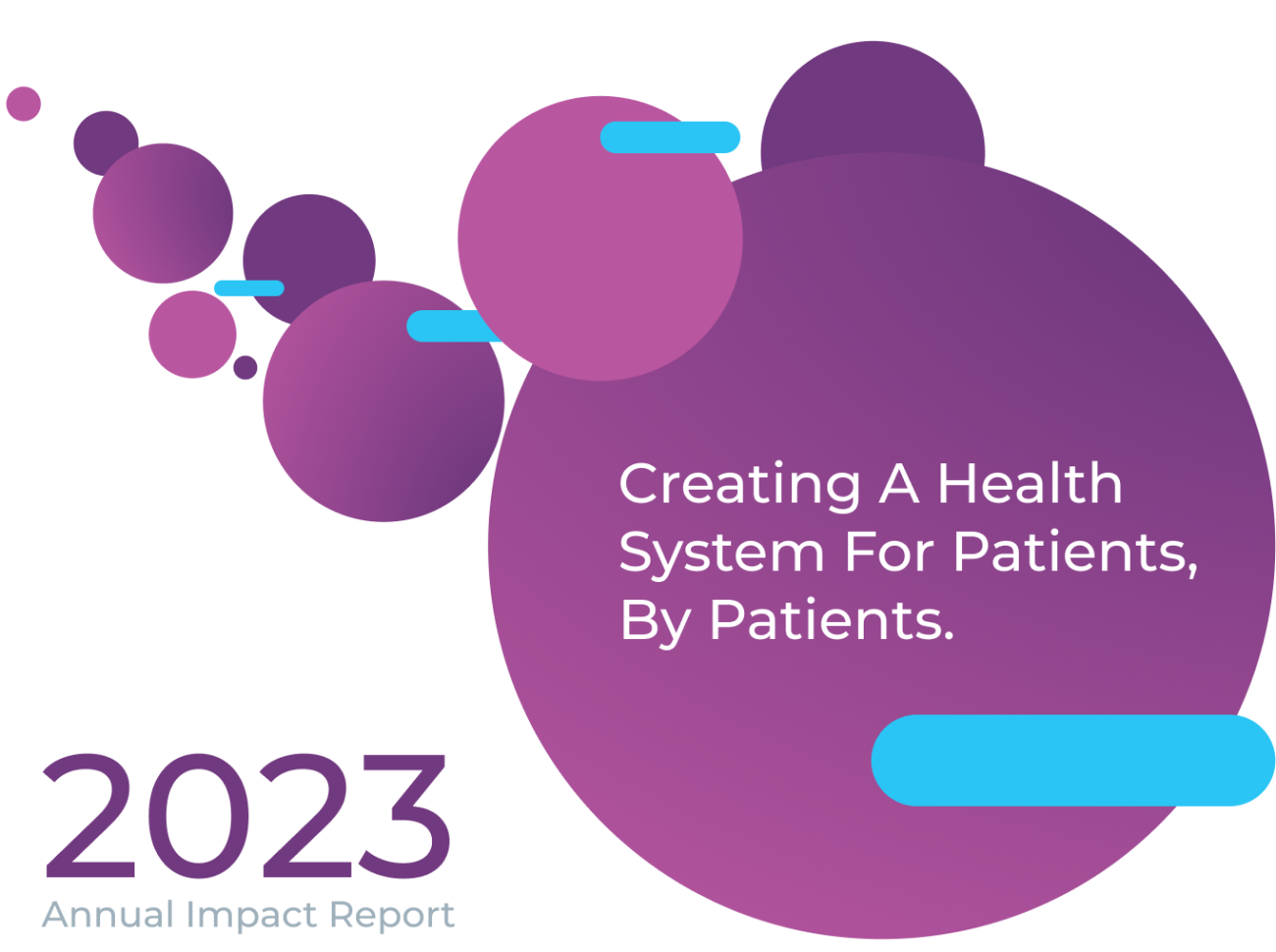
Welcome
We are pleased to report to our partners and funders on the impact of your contributions through our work in patient-oriented research (POR) support in the province of Alberta. In 2022-23, an extraordinary number of people came together to move Alberta’s health system towards common goals, borne out of patient-led priorities.
In 2022, we entered Phase II (2022 – 2026) of our mission. While Phase I focused on increasing the quantity and quality of patient-oriented research in Alberta, Phase II moved into building health system innovations through patient-oriented research that fosters a learning health system. The question of “how” this takes place within Alberta’s health landscape is nuanced. Our partnerships with like-minded organizations, researchers, academic institutions, and industry partners came to the forefront as we unlocked the power of collaboration. Equipped with shared vision and goals, we worked towards streamlining the process for implementing POR-generated research evidence into the planning, policy and practice of our health care system.
Our funding partners enable us to support this important work by providing essential research services, access to vital patient health data, training which encourages an uptick in patient engagement and patient-oriented research, and tools for implementing research findings into the system. While we increase the capacity for POR across the province and country, we continue to work towards sustainability which encompasses a balance of funding and income-producing activities, ensuring that patient-oriented research becomes standard practice in improving health outcomes for all Albertans.
Throughout this report we highlight the numerous and varied projects undertaken by our team, as well as initiatives that encourage high-level systemic change to ultimately spread and scale changes to Alberta’s health system.
About Us
The Alberta SPOR SUPPORT Unit (AbSPORU) is a program innovation aimed at improving health outcomes for Albertans. Your investment in AbSPORU supports new and ongoing patient-oriented health research, strengthening Alberta’s position as a hub for world-class research, and helping to attract new investment and talent to our province. AbSPORU provides expertise, resources, and opportunities across four program components:
Learning Health System
Patient Engagement
Data & Research Services

Capacity Development
AbSPORU serves researchers and research trainees (students), health ecosystem stakeholders, patients, policy makers, as well as other groups within the Strategy for Patient-Oriented Research (SPOR) ecosystem.
A National Strategy
AbSPORU is one of 10 provincial/territorial SPOR SUPPORT Units established by the Canadian Institutes of Health Research (CIHR) as part of its national Strategy for Patient-Oriented Research.
Along with our counterparts, we aim to advance the science, practice and uptake of patient-oriented research in order to provide the evidence needed to inform the development of health policies and improve the health care system. POR is a fundamental continuum of research that engages patients, their caregivers, and families as partners throughout the research process to ensure that studies focus on patient-identified priorities and achieving better patient outcomes.
Letter from Tim Murphy
Nominated Principal Investigator, AbSPORU
Vice President - Health, Alberta Innovates

Alberta Innovates is proud to partner with organizations supporting the shift to new models of person-centred care, enabled by innovation, evidence, and great ideas.
With those partners comes collaboration, and collaboration is, indeed, the new competitive advantage in health care. That’s why Alberta Innovates has supported the Alberta SPOR SUPPORT Unit (AbSPORU) and worked diligently with our partner organizations to sustain progress and create success.

Great Strides
Since its Phase I launch in 2015, AbSPORU, along with Alberta Innovates and other partner organizations, has made great strides in embedding patient-oriented research into Alberta’s health system.
Notably we have:
Supported over 2,000 research support requests with expert advice and resources in important areas like data access and management and patient engagement.
Significantly decreased the time it takes researchers to access health data from years to a matter of weeks.
We’ve bolstered the fostering of a learning health system committed to an evidence-based approac h to continuous quality improvement.
And now, with the launch of Phase II, AbSPORU has set its sights on marshaling the gains from Phase I and applying them in the service of large scale health system transformation.
Looking Ahead
In the words of Sir Isaac Newton: “If I have seen further than others, it is by standing upon the shoulders of giants.” In this spirit, I wish to acknowledge Alberta Innovates’ late President and CEO, Dr. Cy Frank, who was a major catalyst and inspiration for the creation of AbSPORU.
And as proud as Cy would be of the Unit’s accomplishments over the past 7 years, he would no doubt caution us that there remains much work ahead. While public and patient engagement in research increases across Canada, there are many more opportunities to expand the diversity of voices, encouraging participation from all communities – addressing the long standing lack of equity, diversity, inclusion, and accessibility in health research.
Through programs like AbSPORU, Alberta Innovates is helping to harness the ingenuity of researchers who are developing the innovations and technologies needed to make the shift towards a more effective health system a reality.
Letter from Dr. Finlay McAlister
Scientific Director, AbSPORU

AbSPORU remains a force in Alberta’s health research ecosystem, enabled by support, expertise and resources from our partners: Alberta Innovates, the Canadian Institutes of Health Research, University Hospital Foundation, Alberta Health Services, Alberta Health, the Women and Children’s Health Research Institute, the Alberta Children’s Hospital Research Institute, and the universities of Alberta, Calgary, Lethbridge and Athabasca.
This year we continued to make progress towards our goal of bridging the gaps between research evidence and health care practice and policy by moving forward several key projects.

AbSPORU’s Services Support
Important Research
Partnering with Alberta Health Services’ Strategic Clinical Networks, AbSPORU co-developed indicators for patient and family engagement, which solidifies the importance and advances the role of patient engagement in Alberta’s learning health system.
Our Implementation Science Collaborative (ISC) model brings together our partners towards ensuring that patients are at the center of health research. Notably, this model embeds implementation science as a cornerstone of a learning health system and has gained international attention from health innovation organizations in the United States and the United Kingdom.
Connect Care, Alberta’s new province-wide patient health data system, continues its roll-out across the province. AbSPORU continues our work to help develop frameworks, processes and mechanisms for leveraging this “big data” to advance health research and clinical practice.
Working with the SPOR Health Data Research Network (HDRN) and Data Access and Support Hub (DASH), AbSPORU has been able to expand our reach to a national level by supporting multi-jurisdictional studies, pragmatic clinical trials, and provincial and national COVID-19 studies. This year we focused specifically on overcoming data access challenges and are contributing to the development of a Common Data Model which fosters national and international research collaborations.
Partnerships Propel us Forward
Overall, AbSPORU’s partnerships and initiatives within Alberta and beyond continue to make substantial headway in the world of POR resulting in improved patient care and outcomes.
Letter from Kelli Buckreus
Executive Director, AbSPORU

This year, AbSPORU’s leadership undertook an innovative Collective Impact process along with key partners — This approach brought together various groups and aligned them on common social priorities. By integrating our actions, we can compound impact, promote equity, and achieve significant changes at the systemic level.
This process aligned and amplified synergies among AbSPORU’s five operational teams, strengthening their already collaborative relationships and equipping them with enhanced tools to accomplish our organizational goals for the betterment of patient care and outcomes.

Our 2022-23 Impact Report showcases AbSPORU’s numerous remarkable collaborative achievements. In addition to our teams’ collective efforts in implementing a service model that supports researchers in various aspects of patient-oriented research, we made significant contributions to real-world (pragmatic) clinical trials and pivotal COVID studies at provincial and national levels with our many valued partners, both new and existing.
Increasing the capacity for patient-oriented research is of the utmost importance. We remain dedicated to training the next generation of researchers within academia and the health system while including patient partners. We continued to deliver our sought after programs. Our PaCER Program (co-delivered with University of Calgary – Continuing Education), Graduate Studentships, certificate courses, annual conference, and a number of workshops, provide opportunities for embedded and experiential learning that both empower patient voices and advance POR as a methodology, advancing patient-oriented research capacity within Alberta and beyond.
Throughout everything we do, we strive to ensure that patients’ priorities and perspectives remain at the center of patient-oriented research and health-system transformation. Through collective impact, AbSPORU and its partners are advancing patient-oriented research further, together.
Client Testimonial
“Our project application, ‘Nohtawiy (my father): Supporting Cree fathers-to-be using a culturally-appropriate, community led, and strengths-based approach: impact on maternal, infant and paternal outcomes’ was much stronger as a result of the expertise of the Alberta SPOR Support Unit” ― Dr. Richard Oster, Assistant Adjunct Professor – Department of Obstetrics and Gynaecology, University of Alberta
Services*
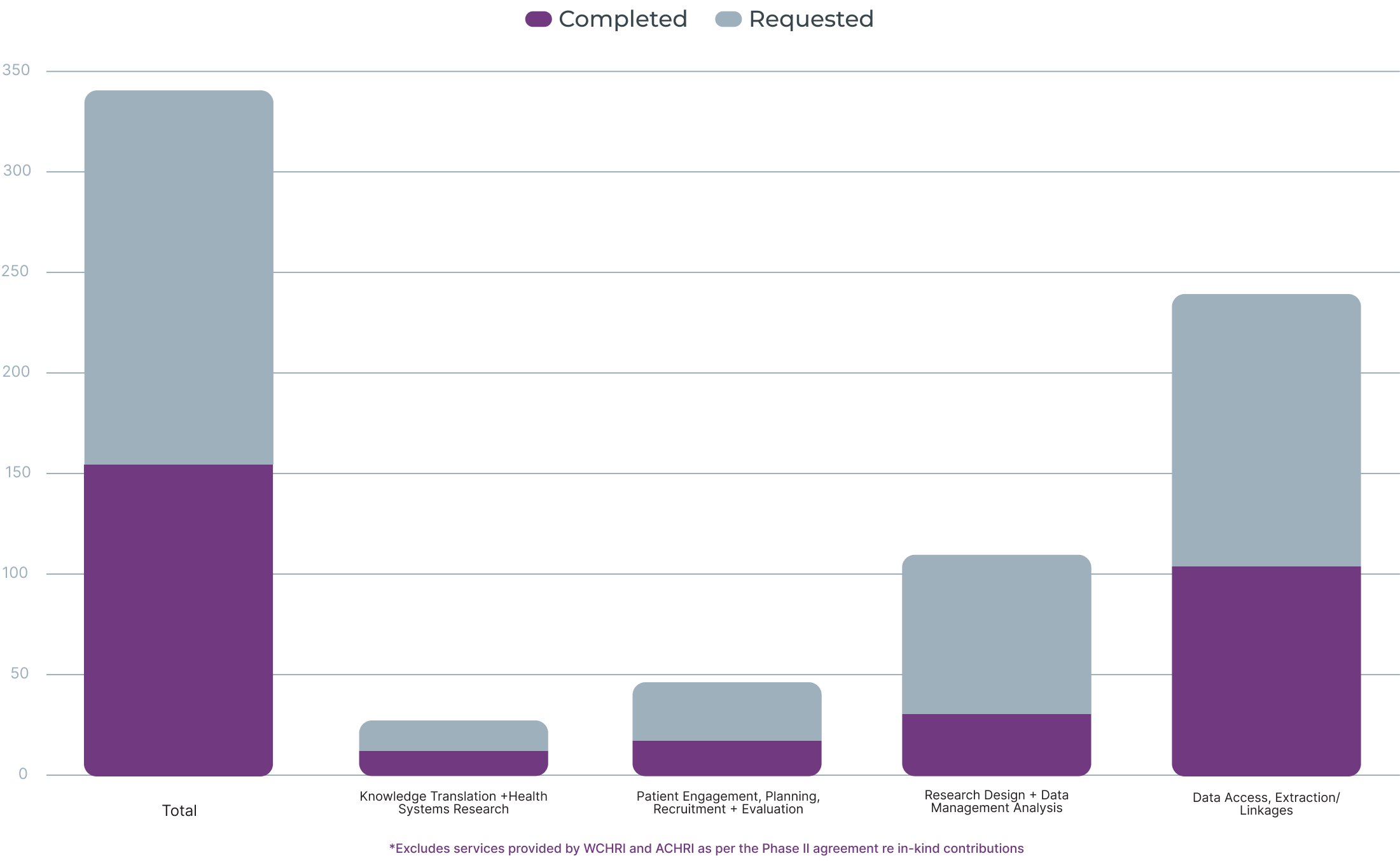
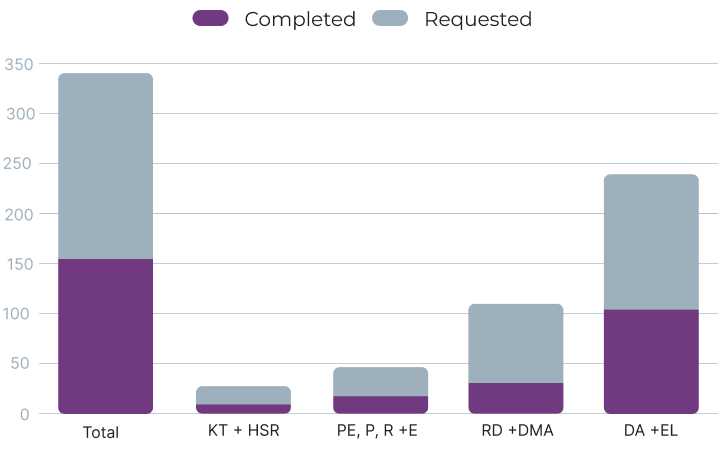
Knowledge Translation + Health Systems Research
Patient Engagement, Planning, Recruitment + Evaluation
Research Design + Data Management Analysis
Data Access, Extraction/ Linkages
6.7
Average Weeks to
Complete Data Services
9.0
Average Weeks to
Complete Data Services
Service Requests by Applicant Type

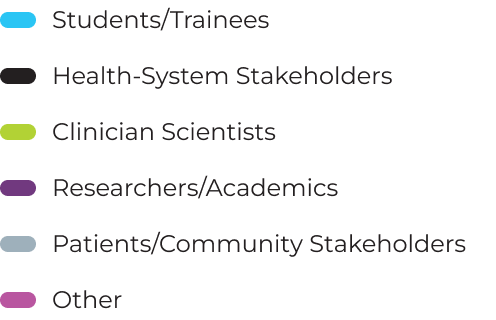

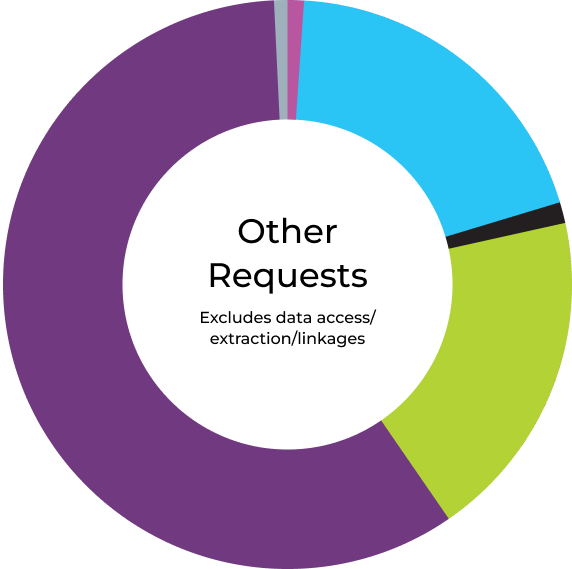
Sample of Research Projects Supported in 2022-2023
Research
Study
Digital Health Innovation to Improve Care of Inflammatory Bowel Disease (IBD) and Liver Diseases – Patient Dashboard
AbSPORU Services
Provided
• Feasibility assessment and secondary use data
• Data extraction/linkage
• Implementation plan development
• Implementation evaluation
• Assess barriers and facilitators to implementation
Monitoring and clinically guiding injured and retired agricultural workers using an advanced virtual care platform: ProMote
• Identify patient research partners
• Patient engagement plan development
• Community groups engagement
• Knowledge translation plan development
• Stakeholder mapping
Makoyoh’sokoi – The Wolf Trail Program Expansion Project (MSK+) – Supporting Indigenous Women to Celebrate Good Health
• Data extraction/linkage
3DUS Examination of the Effect of Arm Position on the Spine Alignment in Adolescent Idiopathic Scoliosis (AIS)
• Data extraction/linkage
• Feasibility assessment and secondary use data
• Clinical trial and study recruitment
• Patient engagement plan development
Understanding and Defining Quality of Care in the Emergency Department with First Nations Members in Alberta
• Data extraction/linkage
Quality Indicators: Towards Measuring the Impact of Crowding and Wait Times on the Quality of Pediatric Emergency Department Care
• Data extraction/linkage
• Methods, design & research question consultation
• Feasibility assessment and secondary use data
A cost analysis study of a novel virtually-delivered overdose monitoring service in Canada
• Feasibility assessment and secondary use data
• Data extraction/linkage
• Knowledge translation plan development
Association between shingles vaccination status and varicella zoster acute retinal necrosis: a pilot study
• Feasibility assessment and secondary use data
• Data extraction/linkage
• Preliminary cohort determination
• Data science/statistical analysis
Client Testimonial
HEADSTART is an ambitious multi-center trial that would revolutionize how aortic dissections are managed across the world. AbSPORU’s ‘Consultation and Research Services Platform’ helped our core investigator group develop a database and data management strategy ― Dr. Vamshi Kotha, Clinical Assistant Professor Department of Radiology, University of Calgary
Executive Summary
2022-23 Annual Impact Report
Through AbSPORU’s expert services, we facilitated numerous research projects and contributed to collaborative initiatives such as pragmatic clinical trials, and provincial, national, and multi-jurisdictional COVID studies.
Capacity development remained a core focus for AbSPORU. Our innovative training opportunities, such as our competitive graduate studentship program, the Leadership in Patient-Oriented Research micro-credential, and the expansion of the PaCER (Patient and Community Engagement Research) program in partnership with UCalgary Continuing Education, empowered patients, researchers, and our community of health professionals to bring patient-informed research evidence into health care planning, practice and policy.
Throughout 2022-23, the Alberta SPOR SUPPORT Unit (AbSPORU) continued to make significant progress in its mission to catalyze a learning health system in Alberta through patient-oriented research which creates patient-centred health care innovation.
Phase II
With a commitment of $36 million in cash and in-kind contributions, partners like the Canadian Institutes of Health Research, Alberta Innovates, the University Hospital Foundation, Alberta Health Services, Alberta Health, the Women and Children’s Health Research Institute (WCHRI), the Alberta Children’s Hospital Research Institute (ACHRI), along with Alberta’s research intensive universities (the universities of Alberta, Calgary, Athabasca, and Lethbridge), came together to form our innovative governance structure for Phase II.
This structure is designed to ensure the long-term sustainability of our organization by connecting AbSPORU to exceptional expertise, leadership, and support in moving forward our mandate to bridge the gap between research evidence and patient care.
AbSPORU and our partners are committed to placing the patient voice at the centre of health research. In Phase II, emphasis is on integrating principles and best practices related to equity, diversity, inclusion and accessibility (EDIA) as well as sex and gender-based analysis (SGBA+), across all facets of patient-oriented research.
Creating Impact Together
AbSPORU continued to forge important connections and collaborations through 2022-23. A “further, together” approach was fostered as the most effective way to bridge the gap between research evidence and patient care, driving real, transformative changes in the health care system.
By bringing together academia, health care providers, and policymakers, AbSPORU serves as an enabler for reaching common impact goals. This takes place at both a provincial and national level, through several multi-jurisdictional research projects, studies and initiatives. We are actively engaged with SPOR groups across Canada, including our provincial/territorial counterparts in the CIHR’s National Strategy for Patient-Oriented Research, the Health Data Research Network (HDRN) and the Data and Access Support Hub (DASH) and local entities such as the Alberta Health Services (AHS) Strategic Clinical Networks.
Demonstrated throughout this report is the impact of some of our strategic partnerships with these groups who share a common agenda for the betterment and innovation of health systems in Alberta and beyond.
Implementation Science Collaborative
Our Implementation Science Collaborative (ISC) played a crucial role in advancing Alberta’s learning health system and beyond. Our research impact assessment framework has gained international recognition by global leaders in patient-oriented research, such as Switzerland and the United Kingdom, for identifying actionable recommendations for overcoming barriers to embedded implementation science and health systems innovation.
Locally, the ISC collaborated with AHS to support the implementation of the Acute Care Bundle Improvement (ACBI) Initiative. The ACBI simplifies how health care providers deliver care to patients while in hospital and while transitioning back to their home. The ACBI is an excellent example of the movement of POR into policy and practice, leading to improved patient experiences, health care quality, and health-system efficiencies.
Including the Indigenous Perspective
Further to our commitments to EDIA and SGBA+, AbSPORU has sought out collaborations with Indigenous groups and patient partners in the spirit of reconciliation towards improving health equity and outcomes for the original owners and caretakers of these lands.
We are proud to support the Métis Settlements Primary Care Initiative in partnership with the AHS Indigenous Wellness Core and the Métis Settlements Health Board. This initiative aims to implement Indigenous ways of knowing into the care of Indigenous Peoples.z
Closing
Our achievements detailed throughout this report underscore AbSPORU’s vital role in the health system and as a leader in research and implementation in Alberta, across the country and the world. Our meaningful partnerships allow us to fulfill this role and mobilize research evidence into policy and practice, centred around the priorities and experiences of patients.
Client Testimonial
“The team at AbSPORU provided excellent support during our CIHR grant writing process. They were instrumental in helping us achieve our goals by providing expertise and guidance.” ― Ayman Abou Mehrem, MD, FABP, MSc (Health Informatics)
Key Achievements
AbSPORU is part of a complex research and innovation ecosystem. Our primary function is to bridge the gap between research evidence and health decisions. We do this by becoming the connection between academia, health providers, policy makers, and patients to address evidence to-care gaps by catalyzing a learning health system, empowering research-informed system transformation to rapidly impact patient care.
AbSPORU’s implementation partner, Alberta Innovates, created and established our novel governance structure that integrates critical partners ― AHS, Alberta Health, Alberta’s four research intensive universities, the national SPOR Networks, the University Hospital Foundation, WCHRI, ACHRI, as well as Alberta Innovates ― who, together, are positioned to build and sustain Alberta’s learning health system through the spread,scale, and advancement of patient-oriented research, putting patients at the centre of health research and health-care innovation.
AbSPORU, its partners and other key stakeholders, through a collective impact process defined a common agenda and aligned strategy around shared goals for health system improvements informed by the patient voice. This process helped refine AbSPORU’s performance management strategy, towards ensuring Unit sustainability.
Supporting Research
AbSPORU supports a large volume of research projects, providing expert services throughout the entire research process. Our teams work collaboratively with various organizations on provincial, national, and multi-jurisdictional studies, pragmatic clinical trials, and POR training resources. Over the past year, we supported Alberta-based research teams through 39 Letters of Support.
Project and Funding Support
AbSPORU, with support from Alberta Innovates and AHS, assisted three teams in securing Partnerships for Research and Innovation in the Health System (PRIHS) funding totalling $3.24M
Our Learning Health Systems team offered consultations on 31 projects.
We introduced consulting services and an integration guide for researchers seeking support with including EDIA and SGBA+ best practices into their projects and grant applications.
We continued to support the BedMed and BedMed Frail pragmatic clinical trials with data collection and analysis services. BedMed has completed participant recruitment with results expected in 2024.
We continued to support Optimize BP and MinMed through the Alberta Pragmatic Trials Collaborative. These trials are ongoing, with completion dates TBD.
As part of the province-wide Long COVID survey and the Long COVID Inter-Professional Outpatient Program (IPOP), we are assisting in the evaluation of the effectiveness of Long COVID clinics in Alberta.
A study utilizing Artificial Intelligence and Machine Learning methods to predict readmissions among patients admitted to the hospital with heart failure is currently underway.
Collaborating on Patient Health Data Access
Out of the 234 data access requests received in the year, requests for projects affiliated with Strategic Clinical Networks (SCN) grew significantly over the prior year. We were able to fulfill 25.6% (60) of the requests, a 16% increase over the previous year.
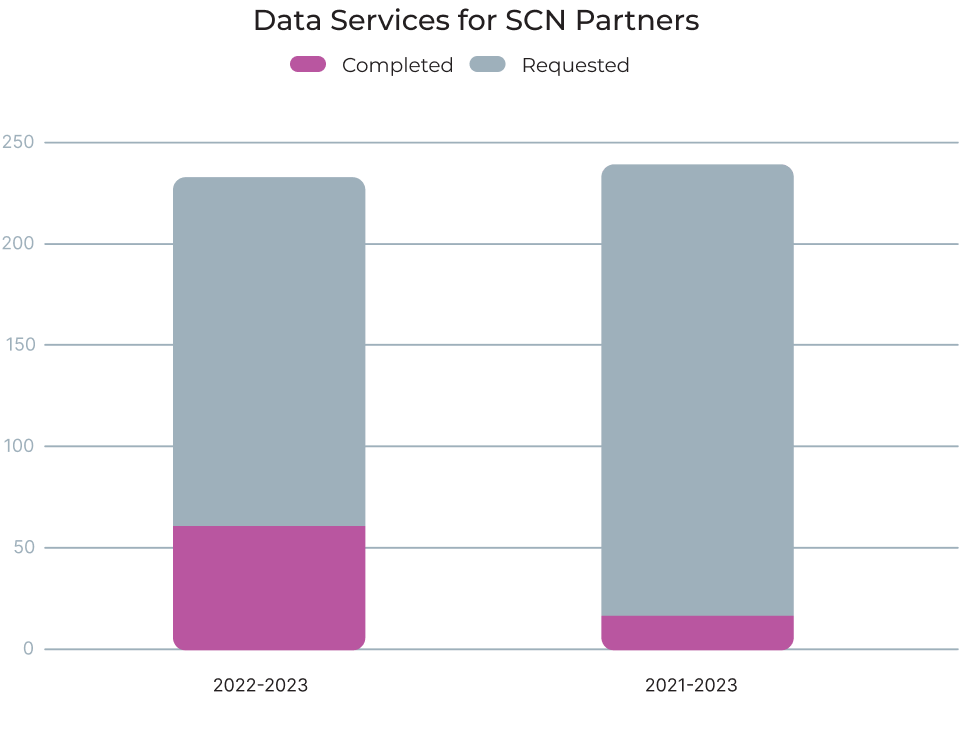
We were also able to increase the number of studies supported using Connect Care data. In 2022-23, 18 studies were supported. We expect the provincial rollout of Connect Care to continue to increase the number of studies supported in coming years.
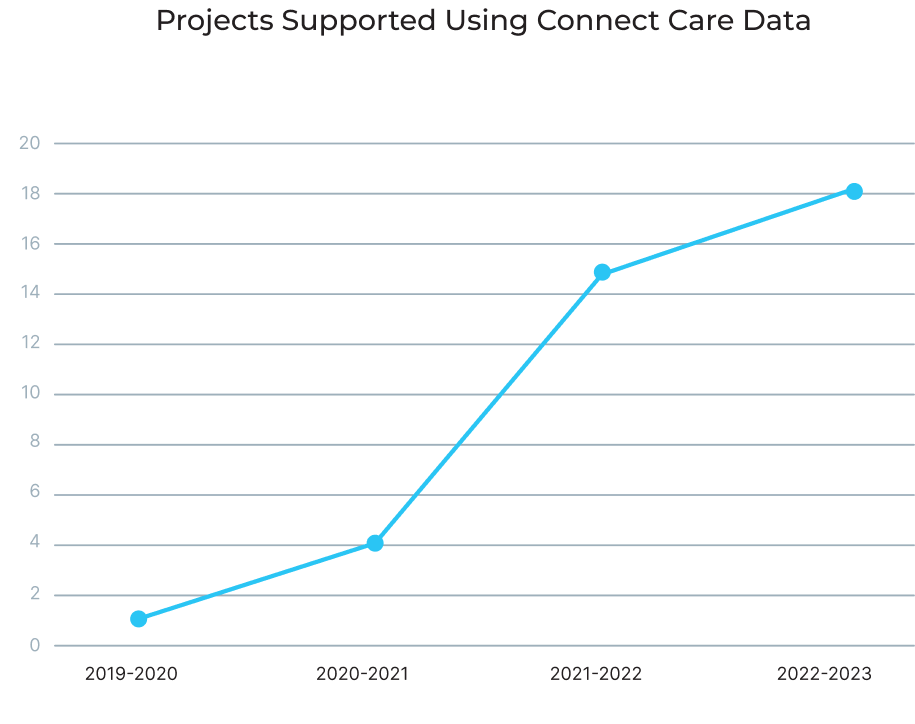
Overcoming Challenges to Data Access
We worked to link CanPATH survey data to provincial data sets, resulting in more efficient and timely support for multi-jurisdictional research projects. We have completed two CanPATH linkage studies with a third near completion. Collaborators: Health Data Research Network (HDRN), Canada’s Data Access and Support Hub (DASH)
Connect Care data was used to facilitate research studies. Collaborators: Alberta Health Services (AHS)
We are currently undertaking test cases for moving to a cloud computing structure, which would allow researchers to work inside the AHS firewall. Collaborators: AHS
We developed the cardiac data schema as a test case for extracting body system-specific data. Collaborators: AHS
Through the successful setup of remote access, we were able to connect researchers in British Columbia to the University of Alberta Research Data Repository (HRDR) to facilitate a project supported by HDRN DASH. This work led to an unofficial agreement with the Faculty of Nursing at the University of Alberta to utilize the HRDR for research studies requiring remote access to data. This agreement is in its pilot phase and if successful, will be used for future multi-jurisdictional projects. Collaborators: UBC, UAlberta Faculty of Nursing, UAlberta HRDR, HDRN DASH.
We have utilized COVID vaccination data to conduct studies to evaluate the impact of vaccination on ICU-admitted patients. The findings of this study may be relevant while developing policies regarding triage protocols when resources are strained in Alberta hospitals. Collaborators: AHS
Additionally, we continue to work on linking provincial Long COVID survey data to health utilization data. Collaborators: Alberta Health, AHS, UAlberta Impact Story: Page 30
We have been involved in several dashboarding projects for the Critical Care SCN (AHS), providing data to determine and monitor best practices. Collaborators: AHS Critical Care SCN
We continued to develop EPIC EMR-based datasets, along with the preliminary integration of REDCap/EPIC. Collaborators: AHS
We continued to develop EPIC EMR-based datasets, along with the preliminary integration of REDCap/EPIC. Collaborators: AHS
We expanded our analyst core by hiring 8 externally funded analysts to our DRS team.
Turning Research into Action
Catalyzing a Learning Health System
A learning health system makes continuous improvements by embedding research evidence and innovations into health care practice and policy, resulting in higher-quality, safer and more efficient care. We are leaders in knowledge translation and implementation science (IS) with our initiatives gaining interest within Alberta and internationally.

Implementation Science Collaborative
Our Implementation Science Collaborative (ISC) and IS certificate address the barriers to successfully integrating health evidence and innovations into the system. Teams internationally have become interested in our ISC model.
We worked to link CanPATH survey data to provincial data sets, resulting in more efficient and timely support for multi-jurisdictional research projects. We have completed two CanPATH linkage studies with a third near completion. Collaborators: Health Data Research Network (HDRN), Canada’s Data Access and Support Hub (DASH)
Connect Care data was used to facilitate research studies. Collaborators: Alberta Health Services (AHS)
We are currently undertaking test cases for moving to a cloud computing structure, which would allow researchers to work inside the AHS firewall. Collaborators: AHS
We developed the cardiac data schema as a test case for extracting body system specific data. Collaborators: AHS
Closer to home, we are collaborating with various entities to support the knowledge translation and implementation needs of several important projects and studies:
We co-developed a strategic implementation framework and playbook for the Acute Care Bundle Improvement (ACBI) Initiative, which provides guidance for implementation to spread and scale the initiative at 14 ACBI hospital sites. Further, a template was created to collect and analyze barriers and facilitators experienced by the sites which will inform appropriate strategies for implementation. Collaborators: Read the ACBI Impact Story
We co-developed and implemented indicators to measure patient engagement which will be embedded into SCN annual reporting to advance a patient-engaged learning health system. Collaborators: SCN Executive team, SCN Patient Engagement Reference Gro
We contributed expertise related to implementation science and evaluation to the development of AHS’ updated Innovation Pipeline Primer document. Collaborators: AHS
After several years of support by our team, a project analyzing the role of intervention adaptations in AHS’ Diabetes and Obesity SCN’s Basal Bolus Insulin Therapy was completed in 2022 and delivered to the SCN. Collaborators: Diabetes, Obesity and Nutrition (DON) SCN
We continued to lead the KT Alberta community of practice through a bi-weekly newsletter. Audience engagement rose from an average of 25% to 35% compared to the previous year. We reached a high of 50% open rate on some editions.
We collaborated to adapt the Stages of Implementation Completion measure, review the knowledge translation and implementation science literature for an evaluation framework, and map barriers and facilitators to evidence-based changes strategies for the Perioperative Glycemic Management Pathway project (PGMP). Collaborators: University of Calgary, AHS
Findings of our social network analysis study provided actionable recommendations for reducing barriers to embedded implementation science in Alberta and will be shared with academic and health system partners.
Serving the needs of Policy Makers
The results of the social network analysis mentioned above were presented to AHS SCN leadership and Covenant Health administrators with the ultimate goal of strengthening Alberta’s learning health system. The findings provide a baseline for monitoring changes in the health-research ecosystem brought about by implementation science.
Over the past year, a significant amount of time was invested in planning the first Optimizing Alberta’s Learning Health System (OALHS) Conference which was held in Calgary in June 2023. The event brought together key stakeholders involved in shaping the policies of our health care system including patient and family advisors, AbSPORU staff and leadership, AHS and AHSaffiliated groups, Alberta Innovates, the Health Quality Council of Alberta, Primary Care and the Physician Learning Programs, and the universities of Alberta and Calgary.
The intention of this event is to foster collaboration among sectors and stakeholders to develop an action plan for optimizing Alberta’s health system, with a focus on leveraging health information systems and data.
Increasing Capacity for Patient-Oriented Research
Health research should include patients – this is not only a fundamental principle of POR, but a concept that is becoming widely recognized as key to improving patient outcomes. Increasing capacity for POR through innovative training opportunities recognizes patients as the experts of their own lived experience. All researchers should have access to knowledge, services, and patient partners to enable their important work.
Training the Next Generation of Researchers
We formally launched a six-course Leadership in Patient-Oriented Research micro-credential, which includes two new certificate courses: Leadership in Patient-Oriented Research: Principles and Practices in Equity, Diversity, and Inclusion and Patient Engagement in Patient-Oriented Research.
For the Leadership in Patient-Oriented Research: Principles and Practices in Equity, Diversity, and Inclusion course, we engaged patients with lived and living experience, academics, and students to help develop course content. The course launched in fall 2022 as a pilot.
We made available to the research community and public free eLearning modules on EDIA, Pragmatic Clinical Trials (PCT), and Patient Engagement. The modules are available online and allow faculty and course instructors to utilize these resources as content in their courses and programs.
Our Patient Engagement eLearning module became an important tool for us and other SPOR units across the country to help potential patient partners learn about their role and train on research methodologies.
In collaboration with the University of Alberta Faculty of Rehabilitation Medicine, we developed a self-directed, online learning program called Using Electronic Health Systems Part II: Integrating Data Into Practice. The program, delivered semi-annually, allows health care practitioners to learn how to use electronic health data and improve quality of care.
We explored digital solutions for conducting and presenting research including digital storytelling and graphic illustration as a knowledge translation tool.
We continued the delivery of our very popular Implementation Science certificate, helping to develop expertise among academics, clinicians, and researchers embedded in the health system.
A study utilizing Artificial Intelligence and Machine Learning methods to predict readmissions among patients admitted to the hospital with heart failure is currently underway.
PaCER Program

Studentships
Our competitive Graduate Studentship Program awards 12 months of funding support towards a thesis-based Master’s or Doctoral degree to undertake research that both meaningfully engages patients and addresses their priorities. All awardees complete a year-long, comprehensive patient-oriented research training component delivered by AbSPORU. Read the Graduate Studentships Impact Story
Our 2022-23 cohort of 24 studentships, including 6 trainees partnering with a national SPOR Network, have completed training.
Collaborations with SPOR Entities
The Strategy for Patient-Oriented Research (SPOR) is a national initiative of CIHR, and developing relationships with other SPOR-funded groups is a critical component of our long-term sustainability and goals for impact.
As such, we continue to foster important connections with national SPOR groups to explore potential partnerships and move forward the overall goals of the strategy in a cohesive way. Many of our leadership team members meet regularly with other SPOR entities to initiate and grow potential partnerships, including:
CHILD-BRIGHT Network
Diabetes Action Canada
IMAGINE SPOR Chronic Disease Network and Patient Engagement Group
Can-SOLVE CKD Network
SPOR Chronic Pain Network
ATTACH Program (University of Calgary)
SPOR Primary Care Research Network
These relationships allow us to leverage these connections in meaningful ways. For example, AHS SCN leadership embedded in AbSPORU and IMAGINE SPOR was able to leverage their roles to secure a $45,000 sponsorship from AHS for a PaCER cohort.
Health Data Research Network
Our Data and Research Services team continues to actively engage the Health Data Research Network (HDRN) and the Data Access Support Hub (DASH). In particular, we are working together on the development of a common data model to facilitate multi-jurisdictional and international collaborations. We work closely with these groups and others, such as the IDEA (Inclusion, Diversity, Equity, Accessibility) Working Group and the Algorithms Harmonization Working Group to improve the processes for supporting multijurisdictional research.
IMAGINE SPOR Chronic Disease Network
In tandem with the IMAGINE SPOR Chronic Disease Network, we facilitated a six-week workshop to train patient partners in Digital Storytelling Methodology. Digital storytelling has proven effective in health research and promotion, and by providing nearly 20 hours of training time to seven learners, we enabled participants to systematically develop their own video stories related to living with inflammatory bowel disease (IBD) and irritable bowel syndrome (IBS), highlighting their experiences with diet and mental health. Subsequently, we co-developed an online webinar with six patient research partners titled: GUT FEELINGS: An IBD & IBS Digital Storytelling Event. The webinar attracted 30 attendees and an additional 80 views of the recorded event.
Our work with IMAGINE SPOR Chronic Disease Network has focused specifically on inflammation, microbiome, alimentation, gastro-intestinal, and neuropsychiatric effects.
Annual Collaborative Forum
Our Annual Collaborative Forum brings together key stakeholders in Alberta’s health research landscape but also engages representatives from SPOR groups across Canada, as well as many individuals from outside Alberta. In 2022, we successfully delivered our first hybrid conference: Embracing the New Normal: Patient-Oriented Research Practices and Impacts. The event hosted nearly 400 attendees both online and in person including patients, researchers, students, clinicians, health system professionals and policy makers.
The conference facilitates the engagement of the POR community and recognizes, showcases and otherwise celebrates the successes and innovation taking place in Alberta and beyond. The partnerships and connections formed at the conference facilitate future training, growth and support of POR and further our mandate to support Alberta-based research and its impact for health system transformation and enhanced patient outcomes.
We look forward to continuing this initiative as a collaboration with SPOR Units in western and northern Canada, such as the new Yukon SPOR SUPPORT Unit, as well as the national SPOR Networks and other active partners.
“The SPOR Consultation and Research Services Platform is an amazing resource for early career researchers! As a new researcher working with an unfamiliar research methodology, the welcoming and knowledgeable experts at AbSPORU helped guide my research design and were available to answer my never ending questions throughout the study process. I am incredibly grateful for the support of the Consultation and Research Services Platform and would not have been able to successfully complete the qualitative aim in my MSc thesis without their guidance.”― Dr. Julie Beveridge, Resident, Department of Surgery University of Alberta
Impact Stories
2022-23 Annual Impact Report
AbSPORU helps to facilitate health system change. The impact that a patient-oriented approach to research has can be both direct and indirect, and takes place along various pathways ultimately leading to changes in policy, practice, process, or behaviour.
The work undertaken by AbSPORU upholds the patient-voice through the many stages of research. By following projects from beginning to end, we can tell the story of how patient-oriented research (POR) has an immediate and lasting impact for the betterment of all Albertans.
Along with POR-centered projects, AbSPORU’s expert staff also work on innovative solutions to common research gaps – data access and management, implementation of research findings, and supporting systemic changes to ensure long-term sustainability within the healthcare system.
In 2022-23, we followed four key projects and initiatives that span the breadth of AbSPORU’s services.
2022-23 Funding Distribution
Cash Contributions excludes contributions from in-kind partners


Funding Allocation
Sample of programming and initiatives supported by funding

Learning Health System
Implementation Science Collaborative (ISC)
The ISC, led by our Learning Health System team at the University of Alberta, provided key implementation support in AHS’ roll-out of the pan-provincial Acute Care Bundle Improvement (ACBI) initiative.
Implementation Science Collaborative (ISC)
The ISC, led by our Learning Health System team at the University of Alberta, provided key implementation support in AHS’ roll-out of the pan-provincial Acute Care Bundle Improvement (ACBI) initiative.

Patient Engagement
Patient and Community Engagement Research (PaCER) Program
PaCER is pan-provincial initiative that trains patient partners on how to do research to support their roles on active research teams. In 2022-23, We delivered two PaCER cohorts, providing hands-on experience conducting research and producing findings and health care policy/practice recommendations.
Patient and Community Engagement Research (PaCER) Program
PaCER is pan-provincial initiative that trains patient partners on how to do research to support their roles on active research teams. In 2022-23, We delivered two PaCER cohorts, providing hands-on experience conducting research and producing findings and health care policy/practice recommendations.

Data & Research Services
Provincial and National COVID Research
Our Data & Research Services team continued to co-lead the Alberta Long COVID Study, and contributed to several provincial, national, and multi-jurisdictional studies investigating the effects of COVID.
Provincial and National COVID Research
Our Data & Research Services team continued to co-lead the Alberta Long COVID Study, and contributed to several provincial, national, and multi-jurisdictional studies investigating the effects of COVID.

Capacity Development
Graduate Studentships in Patient-Oriented Research
Our studentship program provides recipients with $30,000 each to support their thesis research and to complete supplemental training in POR. In 2022-23, we supported 24 studentships including 11 at the University of Alberta, 11 at the University of Calgary, and 2 at the University of Lethbridge.
Graduate Studentships in Patient-Oriented Research
Our studentship program provides recipients with $30,000 each to support their thesis research and to complete supplemental training in POR. In 2022-23, we supported 24 studentships including 11 at the University of Alberta, 11 at the University of Calgary, and 2 at the University of Lethbridge.

Central Operations
Stay connected with AbSPORU and our research by signing up for our emails.
Let us know how you want to stay connected


 News + Events
News + Events

 Patient Partner Research Opportunities
Patient Partner Research Opportunities

 I agree to receive occasional emails from AbSPORU.
I agree to receive occasional emails from AbSPORU.CALGARY
University of Calgary Foothills Campus
3330 Hospital Dr NW
Calgary, AB T2N 4N1
EDMONTON
College Plaza
1702, 8215 112 St NW
Edmonton, AB T6G 2C8
Land Acknowledgment
The Alberta SPOR SUPPORT Unit operates on and acknowledges the lands that are the traditional and ancestral territory of many peoples, presently subject to Treaties 6, 7, and 8. Namely: the Blackfoot Confederacy – Kainai, Piikani, and Siksika – the Cree, Dene, Saulteaux, Nakota Sioux, Stoney Nakoda, and the Tsuu T’ina Nation and the Métis People of Alberta. This includes the Métis Settlements and the Métis Nation of Alberta. We acknowledge the many First Nations, Métis and Inuit who have lived in and cared for these lands for generations. We make this acknowledgment as a reaffirmation of our shared commitment towards reconciliation, and as part of AbSPORU’s mandate towards fostering health system transformation.
© 2025 AbSPORU